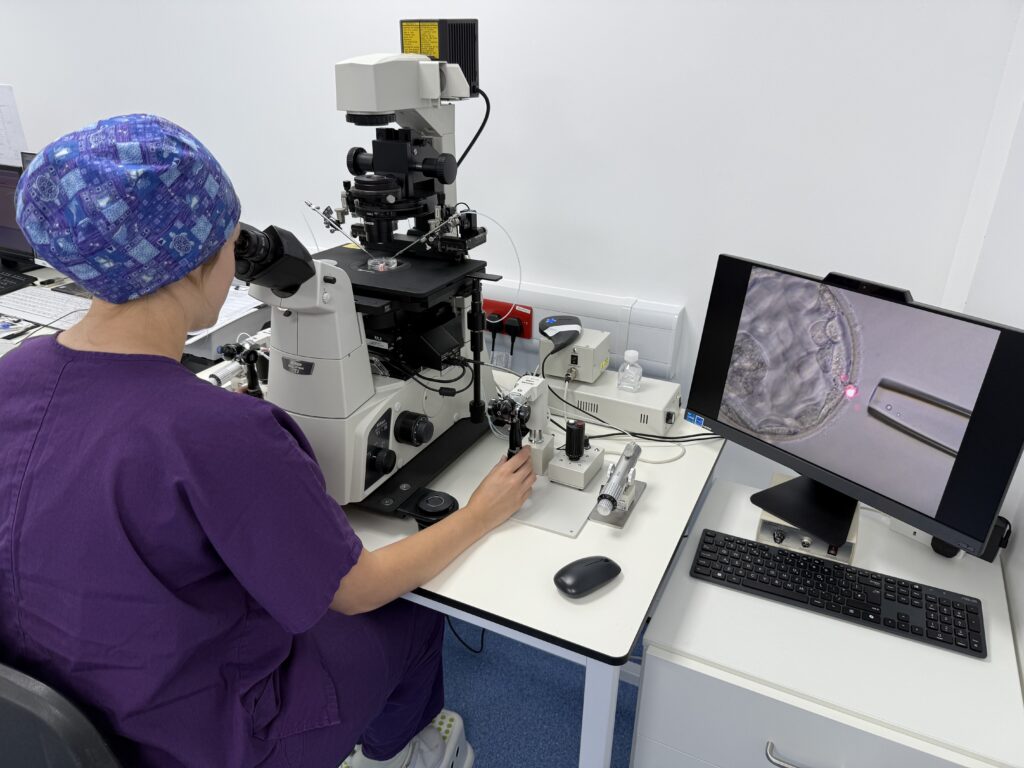Preimplantation Genetic Testing for Aneuploidies (PGT-A) at Concept Fertility Clinic
What is PGT-A?
Preimplantation Genetic Testing for Aneuploidies (PGT-A) is a specialized genetic screening offered during IVF treatment. It is designed to examine the chromosomes of embryos to identify abnormalities (known as aneuploidies) before they are transferred into the uterus. This helps us select the healthiest embryos, reducing time to pregnancy and the risk of miscarriage.
How Does PGT-A Work?
PGT-A can be carried out as part of an IVF cycle and involves the following steps:
- Egg Retrieval and Fertilization: After your eggs are collected and fertilized in our laboratory, they are carefully monitored as they develop into embryos.
- Embryo Biopsy: On day 5 or 6, when the embryos have reached the blastocyst stage, a few cells are gently removed from the outer layer of the embryo. This process is safe and does not harm the embryo.
- Genetic Testing: The biopsied cells are analysed to identify chromosomal abnormalities.
- Embryo Selection: Based on the results, our specialists will identify the embryos with the correct number of chromosomes, which are the most likely to develop into a healthy pregnancy.
Who Can Benefit from PGT-A?
PGT-A may be particularly helpful for:
- Women over 35 years old: The risk of chromosomal abnormalities increases with age.
- Couples with a history of miscarriage: Identifying healthy embryos can help reduce the risk of further miscarriages.
- Couples with repeated IVF failures: PGT-A can help pinpoint embryos with the best chances of implantation.
- Those at risk of chromosomal disorders: For example, if there is a history of genetic conditions in the family.
What Are the Benefits of PGT-A?
- Shorten the time to pregnancy: Avoiding the use of genetically abnormal embryos for embryo transfer reduces the number of transfers needed to reach a pregnancy and therefore decreases the time to pregnancy.
- Reduced risk of miscarriage: Abnormal embryos are a common cause of miscarriage, so avoiding their transfer lowers the likelihood.
- Better planning: PGT-A can help reduce uncertainty during the fertility journey by identifying embryos with the best potential for success.
Is PGT-A Safe?
Yes, PGT-A is a safe and reliable procedure. The biopsy process is performed by highly skilled embryologists and does not harm the embryo’s ability to develop. Embryos that undergo testing can be frozen and stored for future use.
What Are the Limitations of PGT-A?
While PGT-A provides valuable insights, it is important to note:
- It does not guarantee a pregnancy.
- It cannot detect all genetic conditions—PGT-A specifically looks for aneuploidies (abnormal chromosome numbers).
- The decision to use PGT-A should be guided by your unique medical history and discussed with your fertility specialist.
Why Choose Concept Fertility for PGT-A?
At Concept Fertility, we combine state-of-the-art technology with compassionate care to provide the best possible outcomes for our patients. Our expert team works closely with you to determine whether PGT-A is the right choice for your fertility journey. With a highly advanced laboratory and a dedicated team of embryologists and genetic specialists, we ensure that every step of your treatment is handled with precision and care.
Ready to Take the Next Step?
If you’d like to learn more about PGT-A and how it can support your fertility journey, our team is here to help. We offer personalized consultations to guide you through your options and answer any questions you may have.

